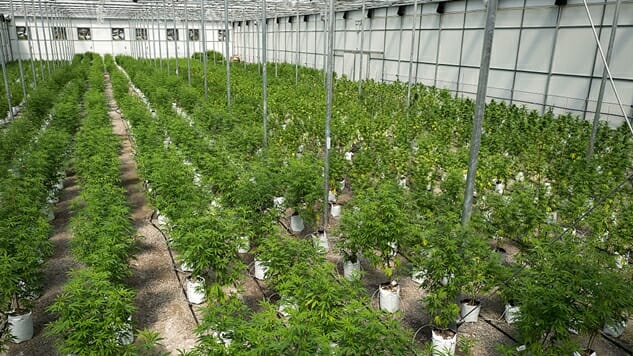The Marijuana Industry May Be Too Big for the Trump Administration to Shut Down
Photo by Drew Angerer/Getty
The marijuana business in the United States is booming. Though the country’s current administration is focused on the coal industry and other manufacturing jobs that are nearing obsolescence, New Frontier Data has predicted that if given the chance, the legal marijuana market—medical and recreational—can create over a quarter of a million jobs by 2020. The Bureau of Labor Statistics states that this is far more than the manufacturing industry is expected to create—in fact, jobs in this field are expected to fall by over 800,000 in the next three years.
The legal marijuana industry has quickly gone from being almost nonexistent to one of the biggest moneymakers in record-breaking time. Though the drug has been prohibited in various capacities in the United States since the early 1900s, there was never a time in American history that it wasn’t present, either as a way to treat pain, relax or use recreationally.
However, that doesn’t mean that there hasn’t always been a stigma associated with the use of cannabis. For decades, weed has been referred to as a “gateway drug,” and users have been deemed lazy burnouts. President Richard Nixon’s “War on Drugs” in the 1970s didn’t help the overall attitude toward the plant either. Despite its many benefits and the fact that you’d be hard pressed to find someone who hasn’t imbibed a time or two in their day, that Reefer Madness-mentality seems to still have a hold on the country. Trump-appointed Attorney General and apparent moral compass Jeff Sessions contributes to this idea by having infamously stated, “good people don’t smoke marijuana.”
Of course, this couldn’t be further from the truth. Anyone who was kind of weird in high school can vouch for the fact that the kids who hung out behind the gym were infinitely nicer and more accepting than the jocks or any other stereotypical teen social group. Also, this wasn’t just a one-off comment.
Sessions and Legalized Marijuana
The Obama administration had worked to put an end to the War on Drugs, reducing prison sentences for people with nonviolent drug charges, but Sessions doesn’t intend to carry on those policies. According to the Washington Post, Sessions has begun working with Steven Cook, a Knoxville prosecutor. Cook used to be a police officer, who has praised the criminal justice system’s handling of drug charges time and time again. The Post also quoted Sessions at a Richmond, Virginia speech to law enforcement in March as saying, “Our nation needs to say clearly once again that using drugs is bad. It will destroy your life.”
Medical cannabis, in reality, is doing the opposite of destroying lives. In 1991, California passed the first medical marijuana initiative and slowly but surely, more and more states have jumped on board. Currently 28 states and Washington D.C. have legalized medical cannabis and eight have legalized it for recreational purposes. There are 17 more states working to legalize it in 2017. Despite countless petitions though, federally, weed is still considered a Schedule-1 narcotic.
This is where establishments like Green Gate Health in Grand Rapids, Michigan come into play. Jessica Foley and Natasha Browley—both of whom have personal experience with the benefits of medical cannabis, own this holistic healthcare center and spa. Foley has epilepsy and Browley is a cancer survivor. They had both tried traditional medicine to treat their conditions in addition to medical cannabis, but had trouble finding quality care and information while learning about it, inspiring them to fill that gap in their community.